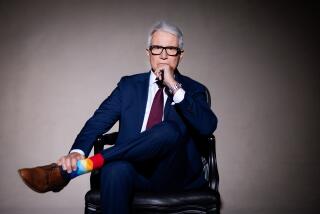Retired Judge Robert Kingsley, Opponent of Death Penalty, Dies
- Share via
Former state appellate judge and law professor Robert Kingsley, who crusaded against the death penalty in California for years, died Christmas night at his Los Angeles home after a long illness. He was 85.
The former dean of the USC School of Law had been ill since poor health forced him to retire from the bench early this year, his wife, Ninon, said. He died in the couple’s Hancock Park home of natural causes.
In the 1950s and ‘60s, as chairman of the southern section of Californians Against Capital Punishment, Kingsley was among those pushing for a ban on the death penalty.
Moral Aspects
“Omitting the moral or ethical aspects of the issue,” Kingsley said, “the death penalty was ineffectual because it provides no deterrent to crime.”
The state Supreme Court outlawed the death penalty in 1972, but a voter-approved constitutional amendment reinstated it in 1977.
Kingsley was no stranger to reversal. In a 1987 decision derided by civil libertarians as a threat to free speech, Kingsley upheld the state’s use of an anti-pandering law to prosecute makers of pornographic films.
“(A) criminal act is not protected under the First Amendment merely because it occurs within the context of a motion picture production,” he wrote in the decision reaffirming a San Fernando Valley film producer’s conviction, the first test of a 1982 law designed to thwart prostitution.
Widely Viewed
The holding was widely viewed as a blow to the state’s adult film industry before the state Supreme Court overturned the conviction in August.
The reversal came near the end of a legal career that spanned more than half a century and began in the dreams of a small boy.
Born in Iowa, Kingsley longed to become a lawyer since childhood, his wife said.
Kingsley received a bachelor’s and law degree from the University of Minnesota and a second law degree from Harvard University.
He started teaching at USC in 1928 and was appointed dean of the law school in 1952. He stepped down in 1963 when he was appointed to the state appellate bench.
He had also been editor-in-chief of the Southern California Law Review.
While a dean, Kingsley decried the primacy of legal professionalism over justice.
‘Formal Training’
“Somewhere along the line, our whole educational system, as it became more and more efficient in formal training, has become less and less efficient in the inculcation of moral values,” he said in a 1952 speech.
Scott Bice, dean of the USC Law School, called Kingsley a “very demanding, very rigorous” professor.
“He was a very gentle gentleman,” said Campbell Lucas, a fellow appellate justice and former student of Kingsley. “I enjoyed him as a professor.”
He was appointed to the 2nd Appellate District Court bench in 1963 by Gov. Edmund G. (Pat) Brown and he spent the next 25 years hearing a variety of cases.
Among them was one in which he voted to uphold the 20-mile limit on the distance any juror can be required to travel to court. However, he said the distance cannot be further reduced for a juror’s convenience if it means denying a defendant a representative jury
“His whole life was law,” his wife said. “He always said he never worked a day in his life, because to him it wasn’t work.”
Although retired from the bench, he continued to consume law books and legal journals with the same ferocity as ever, his wife said.
Music and Arts
He was president of the Los Angeles Civic Light Opera and was one of the founders of the Isomata School of Music and Arts in Idyllwild.
In addition to his wife, he leaves three stepchildren and seven grandchildren.
There will be no services. In lieu of flowers, donations may be sent to the USC Law Center.
More to Read
Sign up for Essential California
The most important California stories and recommendations in your inbox every morning.
You may occasionally receive promotional content from the Los Angeles Times.










